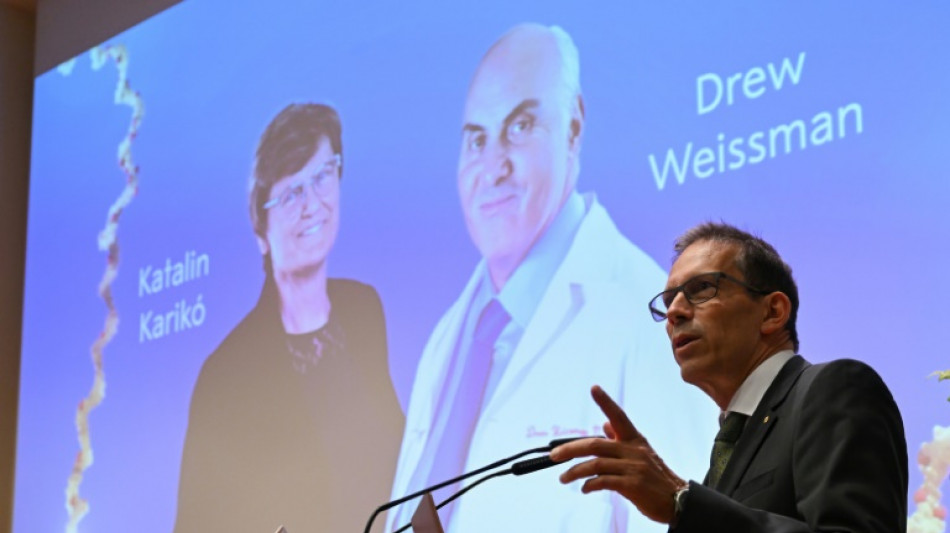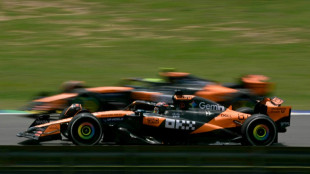
-
 Deadly storm sparks floods in Spain, disrupts Portugal vote
Deadly storm sparks floods in Spain, disrupts Portugal vote
-
Ukrainian flag bearer proud to show his country is still standing

-
 Carney scraps Canada EV sales mandate
Carney scraps Canada EV sales mandate
-
Morocco says evacuated 140,000 people due to severe weather

-
 Spurs boss Frank says Romero outburst 'dealt with internally'
Spurs boss Frank says Romero outburst 'dealt with internally'
-
Giannis suitors make deals as NBA trade deadline nears

-
 Carrick stresses significance of Munich air disaster to Man Utd history
Carrick stresses significance of Munich air disaster to Man Utd history
-
Record January window for transfers despite drop in spending

-
 'Burned inside their houses': Nigerians recount horror of massacre
'Burned inside their houses': Nigerians recount horror of massacre
-
Iran, US prepare for Oman talks after deadly protest crackdown

-
 Winter Olympics opening ceremony nears as virus disrupts ice hockey
Winter Olympics opening ceremony nears as virus disrupts ice hockey
-
Mining giant Rio Tinto abandons Glencore merger bid

-
 Davos forum opens probe into CEO Brende's Epstein links
Davos forum opens probe into CEO Brende's Epstein links
-
ECB warns of stronger euro impact, holds rates

-
 Famine spreading in Sudan's Darfur, warn UN-backed experts
Famine spreading in Sudan's Darfur, warn UN-backed experts
-
Lights back on in eastern Cuba after widespread blackout

-
 Russia, US agree to resume military contacts at Ukraine talks
Russia, US agree to resume military contacts at Ukraine talks
-
Greece aims to cut queues at ancient sites with new portal

-
 No time frame to get Palmer in 'perfect' shape - Rosenior
No time frame to get Palmer in 'perfect' shape - Rosenior
-
Stocks fall as tech valuation fears stoke volatility

-
 US Olympic body backs LA28 leadership amid Wasserman scandal
US Olympic body backs LA28 leadership amid Wasserman scandal
-
Gnabry extends Bayern Munich deal until 2028

-
 England captain Stokes suffers facial injury after being hit by ball
England captain Stokes suffers facial injury after being hit by ball
-
Italy captain Lamaro amongst trio set for 50th caps against Scotland

-
 Piastri plays down McLaren rivalry with champion Norris
Piastri plays down McLaren rivalry with champion Norris
-
ECB holds interest rates as strong euro causes jitters

-
 Spain, Portugal face floods and chaos after deadly new storm
Spain, Portugal face floods and chaos after deadly new storm
-
EU close to sealing trade deal with Australia

-
 German Cup final to stay in Berlin until 2030
German Cup final to stay in Berlin until 2030
-
What does Iran want from talks with the US?

-
 Taming the lion: Olympians take on Bormio's terrifying Stelvio piste
Taming the lion: Olympians take on Bormio's terrifying Stelvio piste
-
Wind turbine maker Vestas sees record revenue in 2025

-
 Italy's Casse tops second Olympic downhill training
Italy's Casse tops second Olympic downhill training
-
Anti-doping boss 'uncomfortable' with Valieva's coach at Olympics

-
 Bitcoin under $70,000 for first time since Trump's election
Bitcoin under $70,000 for first time since Trump's election
-
'I am sorry,' embattled UK PM tells Epstein victims

-
 England's Brook predicts record 300-plus scores at T20 World Cup
England's Brook predicts record 300-plus scores at T20 World Cup
-
Ukraine, Russia swap prisoners, US says 'work remains' to end war

-
 Wales' Rees-Zammit at full-back for Six Nations return against England
Wales' Rees-Zammit at full-back for Six Nations return against England
-
Sad horses and Draco Malfoy: China's unexpected Lunar New Year trends

-
 Hong Kong students dissolve pro-democracy group under 'severe' pressure
Hong Kong students dissolve pro-democracy group under 'severe' pressure
-
Germany claws back 59 mn euros from Amazon over price controls

-
 Germany claws back 70 mn euros from Amazon over price controls
Germany claws back 70 mn euros from Amazon over price controls
-
VW and Stellantis urge help to keep carmaking in Europe

-
 Stock markets drop amid tech concerns before rate calls
Stock markets drop amid tech concerns before rate calls
-
BBVA posts record profit after failed Sabadell takeover

-
 UN human rights agency in 'survival mode': chief
UN human rights agency in 'survival mode': chief
-
Greenpeace slams fossil fuel sponsors for Winter Olympics

-
 Greenpeace slams fossel fuel sponsors for Winter Olympics
Greenpeace slams fossel fuel sponsors for Winter Olympics
-
Kinghorn, Van der Merwe dropped by Scotland for Six Nations opener

| CMSC | -0.17% | 23.48 | $ | |
| SCS | 0.12% | 16.14 | $ | |
| NGG | -0.71% | 87.17 | $ | |
| RBGPF | 0.12% | 82.5 | $ | |
| RYCEF | -0.36% | 16.62 | $ | |
| RIO | -4.49% | 92.335 | $ | |
| CMSD | 0.21% | 23.92 | $ | |
| GSK | 3.44% | 59.27 | $ | |
| BTI | 0.61% | 62.01 | $ | |
| BCE | -4.2% | 25.279 | $ | |
| RELX | 0.73% | 30 | $ | |
| BCC | -2.52% | 88.01 | $ | |
| VOD | -6.98% | 14.685 | $ | |
| AZN | 0.78% | 188.92 | $ | |
| BP | -2.42% | 38.275 | $ | |
| JRI | 0.3% | 13.19 | $ |

Drew Weissman, Nobel-winning mRNA pioneer
Drew Weissman's decades of research into mRNA technology paved the way for Covid-19 vaccines, finally earning a Nobel prize for the physician-scientist.
The 64-year-old University of Pennsylvania immunologist, who won the Nobel Medicine Prize along with long-time collaborator Katalin Kariko on Monday, is far from done.
His next quests include, among others, developing a vaccine against all future coronaviruses.
"There have been three (coronavirus) pandemics or epidemics in the past 20 years," Weissman told AFP recently, referring to the original SARS virus, MERS and Covid-19.
"You have to assume there's going to be more, and our idea was that we could wait for the next coronavirus epidemic or pandemic, and then spend a year and a half making a vaccine. Or we could make one now."
- Twin breakthroughs-
The world is now aware of the elegance of the mRNA (messenger ribonucleic acid) vaccines, that deliver genetic instructions to cells telling them to recreate the spike protein of the coronavirus, in order to trigger effective antibodies when they encounter the real thing.
But back when Weissman teamed up with Kariko in the 1990s, the research was considered a scientific dead-end, and working with DNA was considered a more promising avenue.
"We started working together in 1998, and that was without much funding and without much in the way of publications," he said.
In 2005, the pair found a way to alter synthetic RNA to stop it from causing a massive inflammatory response found in animal experiments.
"Just before our paper was published, I said 'Our phones are going to ring off the hook,'" he recalls.
"We sat there staring at our phones for five years, and they never rang!"
With a second big breakthrough in 2015, they found a new way to deliver the particles safely and effectively to their target cells, using a fatty coating called "lipid nanoparticles."
Both developments are part of the Pfizer and Moderna Covid-19 vaccines today.
- Helping people -
Weissman grew up in Lexington, Massachusetts.
His father and mother, both since retired, were an engineer and dental hygienist, respectively.
"When I was five years old, I was diagnosed as a type-one diabetic, and back then it was testing urine and taking insulin shots a few times a day," he recalled, and this motivated him to pursue science.
He was educated at Brandeis University and completed an MD-Phd program in immunology at Boston University.
As a young fellow at the National Institutes of Health, he worked for several years in Anthony Fauci's lab on HIV research, before finally arriving at his long-time home Penn.
Weissman was a practicing doctor until a few years ago, and says it brings him great joy that his invention has helped save millions of lives.
"I'm a clinician scientist, my dream since starting college and medical school was to make something that helps people. I think I can say that I've done that. So I am incredibly happy," he said.
Beyond vaccines, mRNA technology is also being heralded for its potential across medicine.
Weissman's team is working on using RNA to develop a single-injection gene therapy to overcome the defect that causes sickle cell anemia, a genetic blood disease that 200,000 babies are born with in Africa every year.
Significant technical challenges remain to ensure the treatment is able to correctly edit genes and is safe, but the researchers are hopeful.
Bone marrow transplant, an expensive treatment with serious risks, is currently the only cure.
G.AbuHamad--SF-PST




